Saturday, November 15, 2003
107

**credit below
How can one read the psalms from the perspective of non-duality ? They are, after all, songs that explore the Man-God relationship. Are they dual/non-dual "like box and lid joining" ? Zen teacher Norman Fischer has produced his own "translations" of the psalms which I find less pleasing than the BCP psalter's wonderful poetry, but the fact that a Zen teacher is drawn to them makes me feel that the question has some intellectual validity.
Today I thought of psalm 107 which I read one morning last summer on our vacation, literally seaside, as DK was off bicycling. It's the one with the famous "down to the sea in ships" line. I was instantly struck by its serial descriptions of various mental and spiritual states. Depression, spiritual accedia, refusal, rebellion -- states familiar to all humans. And all are resolved, anaphorically, as follows:
Then they cried to the Lord in their troubles
and he delivered them from their distress
There are four sections. The middle two posit "rebellion" as the cause of the distress. But the first simply describes wanderers:
Some wandered in desert wastes
they found no way to a city where they might dwell
they were hungry and thirsty
their spirits languished within them
These are the exiles, the homeless ones, the alienated, the marginal. The people who find no sustenence in what the Usual City offers: mindless work, ceaseless consumption of goods and entertainments, competition for wealth and recognition and power, visual ugliness, moral lowness, spiritual crassness and mendacity. Wherever they are within this city, it is a desert. Or, perhaps, they have sought a literal desert, turned away, self-exiled, turned outwardly eremitical, sought inner emptiness. They are the blessedly empty ones of the beatitudes, the hungry and thirsty who are fed by the plenum of true emptiness.
form is emptiness, emptiness is form
The next group of the afflicted have rebelled against the "word" of God. One could read them as literal law-breaking prisoners, enjoying what our former Governor, the reactionary William Weld, once called, prescriptively, "the joy of busting rocks." I read them as depressed, as refusing, as self-enclosed, withdrawn, disconnected. Bartlebies, preferring not to. How is this against the "word of God" ? I hear "word of God" as more "nature of things," or the Way, the Tao. In denying or rejecting one's connection with the web of existence, one becomes as the psalmist describes:
Some sat in darkness and deep gloom
bound fast in misery and iron
because they rebelled against the word of God
...
so he humbled their spirits with hard labor.
In such a state, everything becomes "hard labor." The body itself seems leaden. Thinking is an effort. As GM Hopkins said, "Self-yeast of spirit a dull dough sours." If one of the Three Kilesas is operative, it is hatred. Rejection. Pushing away.
The third group are also rebels, but of a different sort.
Some were fools and took to rebellious ways
They were afflicted because of their sins
They abhorred all manner of food
And drew near to death's door
"Fools" and "rebellious ways" imply more active deviation from the Word, or from the Way. These sinners become "afflicted" unto "death," unable to take in that which is essential for life, be it literal nourishment, or figurative. Perhaps what they HAVE taken in has made them ill, nauseated, self-disgusted. Greed leading to hatred. All for delusion's sake: this will make me strong, wealthy, important, holy, powerful.
Finally, we have the last group, and, to my reading, the strangest. On the face of it, they are honest workmen going about their business, recognizing the "works of the Lord/and his wonders"
Some went down to the sea in ships
and plied their trade in deep waters
They beheld the works of the Lord
and his wonders in the deep
when suddenly a huge, God-inflicted storm overtakes them, and they are in tremendous peril and fear.
Who are these people ? Church-going citizens, productive, law-abiding, religious, good -- complacent people. People going through the spiritual motions, half-asleep. Vaguely comforted by their religion, unquestioning. Then, suddenly, they are up-ended, rocked to their depths by existential peril of the most harrowing kind.
Each of these four groups, in extremis, "cry to the Lord in their troubles," and are "delivered."
There it is again -- the "appeal," the great "de profundis" cry that Christianity articulates so brilliantly.
I think that in the crying out, in that moment of awful submission and recognition of one's fundamental, naked afflicted reality, in that excruciating moment, is where deliverance begins.
**www.metmuseum.org
Artist/Maker William Bradford (1823–1892) Title/Object Name Shipwreck off Nantucket (Wreck off Nantucket after a Storm) Date ca. 1860–61 Medium Oil on canvas Dimensions 40 x 64 in. (101.6 x 162.6 cm) Credit Line (Accession No.) Purchase, John Osgood and Elizabeth Blanchard Memorial Fund, Fosburgh Fund Inc. Gift, and Maria DeWitt Jesup Fund, 1971 (1971.192)
Friday, November 14, 2003
Avuncular
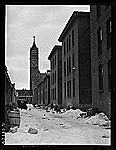
Workers' Houses, Lowell, Massachusetts
Jack Delano, Library of Congress LC-USF34- 042897-D
My Lithuanian uncle, Peter, who died a few years ago, was a passionate logophile and letter-to-the-editor writer. A classic autodidact. Over the years the Lawrence Eagle-Tribune published hundreds of his letters; he clipped them all and kept them in neat, chronological binders. His topics ranged from nature to politics. After his death, DK and I scanned and typed them into computer files and printed them up for his widow, my aunt.
One of his letters, an anecdote from his impoverished youth in Lowell, Massachusetts, inspired the following poem.
Oni
for Peter
The boy, stumbling in a root-bound meadow,
is looking for oni. Birds decant
thick, gold gouts of melody
into the raw throat of the air.
Get oni, his Ma said. Oni.
Oni for his tonsillar sister.
He tongues and tongues the queer lozenge.
Oni buzzes among his buds.
No doctor would brave the river’s breath,
his mother, her miasmas of hair,
her spoons. She knew poison
when she saw it. She saw it everywhere,
bound her head in rags, gargled beet, leek, horse-
radish, viski against it. But oni was medus,
sweet. Was medicine, antidote.
He knows the taste of medus. LeDoux
doesn’t. Oni oni ? Oignons ? Dans un apothecaire ?
Blunt retorts, flasks of aqua-aqua, sachets, pastilles
and pestles mock him to the sidewalk,
and there she is, waiting for him, Lune de Miel.
Oni, he begs. She waxes sideways
undulant, laughing soit qui mal y pense,
naughty garçon, tes pensées t’empoisonnent.
He flees. He knows all her names.
Menusis, wafering the night’s tongue.
Loon’s song, menstrual sister,
mill, looming the Merrimack,
to a fallen stole of moonlight and brick.
Sundays the Cardinal intones Methuselah !
Lunatic, they whisper, pointing at Ma.
Medusa, says his sister, pointing at snakes.
Sanctuary, the boy prays, Oni,
and genuflects into the baznytele
where the grocer, Paterson, officiates
behind an immaculate countertop.
His apron’s a pentecost of daily blood.
Eat, my child, bids Paterson, and drink.
Accept the motley sacrament of speech.
For you the world has fallen into word,
as sin and sacrifice. Spread this good news.
And with two hands he lifts and consecrates
a jar inscribed with clover, hives and bees,
their heads thrust deep in purple, calyxed froth,
sounding for nectar, stigmata, oni.
Bells spritz. The boy rejoices, tingling.
He’s found his medus, his mead, his Oni grail,
the honey soit qui miel y pense where word
and world both lie, sweet nothings, on the tongue.
Notes From the Lost Vegan
As a vegan, I believe that


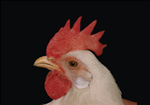
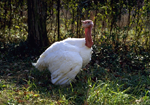
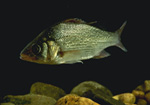

should not be transformed into
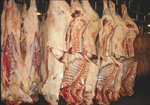
 and
and 
(photos:USDA)
A vegan strives to respect animals as fellow creatures by using them as little as possible. This extends to animal by-products in cosmetics, food and household products. Veganism goes further than vegetarianism by avoiding eggs and milk, both for the theoretical notion of non-usage/exploitation, and for the painful factory farm conditions under which hens and dairy cows must exist. We avoid leather, wool, silk and honey as well. As I've said elsewhere, I am not a perfect vegan: peppermint life savers, and mainstream toothpaste, shampoo and laundry detergent are my secret vices. And I'm working on the peppermints.
Dennis Kucinich rocks. (He is a vegan.)
A friend said, facetiously, that I should not vote for someone so elvish. (As in elf, not Presley, who is, come to think of it, the Anti-Vegan.)
But don't you think Joe Lieberman's got a way more elfen face than Dennis ?


Speaking of the Democrats.
There are more than several things about Dr Dean that ANNOY me. He likes GUNS. He will not use the word "marriage" with respect to gay unions.
And, for goodness sakes, he was on that silly HBO infopolitocodramadocutainment piece of crap, "K Street," (we watched it once, nearly got TMJ from the jaw droppingness of it) a series that links real-life pundits, politicians and current events with fictional actors and soap opera story lines in a vile compote of ludicracy, narcissism, and general degradation of the national conversation.
If you try to tell me it's "edgy" -- let's just leave it at don't even try. That word has become the excuse for all that's vulgar, exploitative, loud and demeaning about our culture. I don't buy it, and all the other stuff it's selling.
C'mon, Doctor Dean. Give us a serious break here. I mean REALLY !
I would like to like Kerry.
I would love to vote for Kucinich.
I could vote for Dean. He might be annoying, but unlike the current unelected resident of the White House, he is not sanctimonious, mendacious, incurious, inarticulate, unintelligent, deluded, greedy, bellicose, simple-mindedly manichean, dangerous, or evil.
I've left out a lot of modifiers, but you get the picture.






should not be transformed into

 and
and 
(photos:USDA)
A vegan strives to respect animals as fellow creatures by using them as little as possible. This extends to animal by-products in cosmetics, food and household products. Veganism goes further than vegetarianism by avoiding eggs and milk, both for the theoretical notion of non-usage/exploitation, and for the painful factory farm conditions under which hens and dairy cows must exist. We avoid leather, wool, silk and honey as well. As I've said elsewhere, I am not a perfect vegan: peppermint life savers, and mainstream toothpaste, shampoo and laundry detergent are my secret vices. And I'm working on the peppermints.
Dennis Kucinich rocks. (He is a vegan.)
A friend said, facetiously, that I should not vote for someone so elvish. (As in elf, not Presley, who is, come to think of it, the Anti-Vegan.)
But don't you think Joe Lieberman's got a way more elfen face than Dennis ?


Speaking of the Democrats.
There are more than several things about Dr Dean that ANNOY me. He likes GUNS. He will not use the word "marriage" with respect to gay unions.
And, for goodness sakes, he was on that silly HBO infopolitocodramadocutainment piece of crap, "K Street," (we watched it once, nearly got TMJ from the jaw droppingness of it) a series that links real-life pundits, politicians and current events with fictional actors and soap opera story lines in a vile compote of ludicracy, narcissism, and general degradation of the national conversation.
If you try to tell me it's "edgy" -- let's just leave it at don't even try. That word has become the excuse for all that's vulgar, exploitative, loud and demeaning about our culture. I don't buy it, and all the other stuff it's selling.
C'mon, Doctor Dean. Give us a serious break here. I mean REALLY !
I would like to like Kerry.
I would love to vote for Kucinich.
I could vote for Dean. He might be annoying, but unlike the current unelected resident of the White House, he is not sanctimonious, mendacious, incurious, inarticulate, unintelligent, deluded, greedy, bellicose, simple-mindedly manichean, dangerous, or evil.
I've left out a lot of modifiers, but you get the picture.
Thursday, November 13, 2003
Spleen
Dysphoria, dressed up as Baudelarian Spleen, leads one to certain poets.
I began with Philip Larkin, searching out "Church Going," thinking of my own impulse to go into a church, and found the line
A serious house on serious earth it is
Yes, one can say that. It requires no leap of faith, no assumptions of transcendence, no fears of engaging in mauvais foi.
Then I found "Aubade," an insomniac's fitful and harrowed timor mortis, ending with morning, the workaday distractions resuming,
The sky is white as clay, with no sun.
Work has to be done.
Postmen like doctors go from house to house.
My dysphoria thus fueled, I turned to my favorite poem in this genre, Weldon Kees' "Equinox."
The setting is Northern, cold, winter. A "sequestered and snow-haunted world." An ancient, half-blind, dementing Spanish woman sits in a "claw-and-ball-foot chair" at a "frozen window" overlooking a bay. The world itself could be ending -- there are abandoned boats, dead fish on the shore, a few last corroding cans of beans on her shelf, a village whose chimneys no longer emit smoke, cottages where "no lights burn."
...Exile without remembrance,
spawned in the heat to perish in this cold,
Ravaged by paresis, and her sight at last
A blackness in the blood, she moves her chair
Inch by excruciating inch, her face
steered -- raw, blank, aching -- toward the beans:
The last survivor of the race.
Phew. That cuts us down to size, huh ? Reduced to blind appetite in a dying world.
Notice the irony of the title.
I wrote a poem about Kees in 1998. I'd written a book-length series called QABEN, ostensibly "about" the flooding of a central Massachusetts valley in the 1930's to form our "Quabbin Reservoir," but more about other historical obliterations, and watery purifications. I included in it homage to three poets: Berryman, Kees and Crane, all of who jumped to their water or not-water deaths from various rails -- Berryman off a bridge onto dry ground, Kees probably from the Golden Gate, and Crane off the side of a cruise ship into the sea. There are pictures of each of these men in their youth in their biographies in which, gaunt and mustachioed, they eerily resemble one another. Especially Crane and Kees.
I did massive reaearch for QABEN, including a hard-hatted tour of Boston Harbor's brand new Deer Island sewage treatment plant. (A logical and symmetrical end point for a series about drinking water, eh ?) Deer Island had been the site of a Native American concentration camp during King Philip's War, and subsequently of poorhouses, quarantine hospitals, orphanages and prisons. Finally, sewage treatment: the ultimate institution of "purification."
Here's my Kees poem, and its footnote.
7.18.55
Small wonder... /...that the sleuth, LeRoux, is now incurably insane
-- W. Kees, “Crime Club”
At wits’ extreme, they summoned old LeRoux
from Langley Porter’s chronic, chronic ward.
A month of Thorazine had done what years
of depth analysis and shock could not:
had stopped his screams. It was something, anyway.
His trench coat gave off mildew, naphthalene.
-- Where are we going , please ? He winced and blinked
as dull green tile gave way to dull green air.
-- 1980 Filbert, Sir. Get in.
No nut joke passed the rookie driver’s lips.
He’d been forewarned. He’d heard of Jack LeRoux,
the crackerjack dick who’d cracked in ‘28.
They say each sleuth shall meet his waterloo,
his sinkhole of unfathomable clues.
His was the Potato Masher case. Jeez,
if the guy had been a bit more patient !
The door-to-door utensils man confessed
to everything -- the Shirley Temple con,
the sporting goods swindle, the death blow.
And now the reborn necromancer swayed
in the squad car’s back seat -- Excuse me,
officer, would you mind, the siren ? Please ?
The long-lost broken wavelets tugged at him
as they withdrew. He sighed. Just like old times --
the car abandoned by the Golden Gate.
The fog. No note. The cat called Lonesome gone.
The small apartment, festooned in yellow tape.
Red socks soaking in the bathroom sink.
On the kitchen floor, one dish of milk
curdling. Most of the Jack Daniels left.
Sheet music on the piano, blues. Bedside,
Unamuno’s Tragic Sense Of Life,
Dostoevsky’s The Devils. LeRoux sneezed.
They handed him the transcripts, interviews --
the usual friends, in grief’s confessional,
recalling clues they’d lost, pooh poohed, ignored.
“I think Hart Crane had the right idea.”
“I couldn’t get my foot over the rail.”
“I may go to Mexico. To stay.”
“What keeps you going ?” “Things are pretty bad.”
“Nobody seems to be doing anything.”
“I won’t.” “I won’t.” -- And then he curveshipped out,
is that it ? Shrill shirt ballooning like a sail ?
Posterity will have him puttering
into his dotage in some hacienda,
or dead, and that’s the warble of it, men --
the bathers leave the water, their smiles fade,
the roof opens to one last monstrous flood,
and I, I must be getting back. It’s time
for medication, hydrotherapy
and supper, beans tonight I think. I like
baked beans. Spaghetti. Chocolate milk. Pie.
Tuesday’s television night. Wednesday’s crafts.
I’m doing better lately. It’s so strange.
(The poet Weldon Kees disappeared on 7.18.55. His car was found near the Golden Gate Bridge. Langley Porter is a famous psychiatric hospital in San Francisco. Details in stanzas 5-7 are from Robert Knoll’s Weldon Kees and the Mid Century Generation, Letters 1935-1955. “7.18.55” contains references to three of Kees’ poems -- “Crime Club,” and, in the last 2 lines, “The Smiles Of The Bathers” and “If This Room Is Our World.” The baked beans and spaghetti are borrowed from “Equinox,” to me, one of Kees most disturbing poems. “Curveship” and “shrill shirt ballooning,” are, of course, from Hart Crane’s “The Bridge.” )
I began with Philip Larkin, searching out "Church Going," thinking of my own impulse to go into a church, and found the line
A serious house on serious earth it is
Yes, one can say that. It requires no leap of faith, no assumptions of transcendence, no fears of engaging in mauvais foi.
Then I found "Aubade," an insomniac's fitful and harrowed timor mortis, ending with morning, the workaday distractions resuming,
The sky is white as clay, with no sun.
Work has to be done.
Postmen like doctors go from house to house.
My dysphoria thus fueled, I turned to my favorite poem in this genre, Weldon Kees' "Equinox."
The setting is Northern, cold, winter. A "sequestered and snow-haunted world." An ancient, half-blind, dementing Spanish woman sits in a "claw-and-ball-foot chair" at a "frozen window" overlooking a bay. The world itself could be ending -- there are abandoned boats, dead fish on the shore, a few last corroding cans of beans on her shelf, a village whose chimneys no longer emit smoke, cottages where "no lights burn."
...Exile without remembrance,
spawned in the heat to perish in this cold,
Ravaged by paresis, and her sight at last
A blackness in the blood, she moves her chair
Inch by excruciating inch, her face
steered -- raw, blank, aching -- toward the beans:
The last survivor of the race.
Phew. That cuts us down to size, huh ? Reduced to blind appetite in a dying world.
Notice the irony of the title.
I wrote a poem about Kees in 1998. I'd written a book-length series called QABEN, ostensibly "about" the flooding of a central Massachusetts valley in the 1930's to form our "Quabbin Reservoir," but more about other historical obliterations, and watery purifications. I included in it homage to three poets: Berryman, Kees and Crane, all of who jumped to their water or not-water deaths from various rails -- Berryman off a bridge onto dry ground, Kees probably from the Golden Gate, and Crane off the side of a cruise ship into the sea. There are pictures of each of these men in their youth in their biographies in which, gaunt and mustachioed, they eerily resemble one another. Especially Crane and Kees.
I did massive reaearch for QABEN, including a hard-hatted tour of Boston Harbor's brand new Deer Island sewage treatment plant. (A logical and symmetrical end point for a series about drinking water, eh ?) Deer Island had been the site of a Native American concentration camp during King Philip's War, and subsequently of poorhouses, quarantine hospitals, orphanages and prisons. Finally, sewage treatment: the ultimate institution of "purification."
Here's my Kees poem, and its footnote.
7.18.55
Small wonder... /...that the sleuth, LeRoux, is now incurably insane
-- W. Kees, “Crime Club”
At wits’ extreme, they summoned old LeRoux
from Langley Porter’s chronic, chronic ward.
A month of Thorazine had done what years
of depth analysis and shock could not:
had stopped his screams. It was something, anyway.
His trench coat gave off mildew, naphthalene.
-- Where are we going , please ? He winced and blinked
as dull green tile gave way to dull green air.
-- 1980 Filbert, Sir. Get in.
No nut joke passed the rookie driver’s lips.
He’d been forewarned. He’d heard of Jack LeRoux,
the crackerjack dick who’d cracked in ‘28.
They say each sleuth shall meet his waterloo,
his sinkhole of unfathomable clues.
His was the Potato Masher case. Jeez,
if the guy had been a bit more patient !
The door-to-door utensils man confessed
to everything -- the Shirley Temple con,
the sporting goods swindle, the death blow.
And now the reborn necromancer swayed
in the squad car’s back seat -- Excuse me,
officer, would you mind, the siren ? Please ?
The long-lost broken wavelets tugged at him
as they withdrew. He sighed. Just like old times --
the car abandoned by the Golden Gate.
The fog. No note. The cat called Lonesome gone.
The small apartment, festooned in yellow tape.
Red socks soaking in the bathroom sink.
On the kitchen floor, one dish of milk
curdling. Most of the Jack Daniels left.
Sheet music on the piano, blues. Bedside,
Unamuno’s Tragic Sense Of Life,
Dostoevsky’s The Devils. LeRoux sneezed.
They handed him the transcripts, interviews --
the usual friends, in grief’s confessional,
recalling clues they’d lost, pooh poohed, ignored.
“I think Hart Crane had the right idea.”
“I couldn’t get my foot over the rail.”
“I may go to Mexico. To stay.”
“What keeps you going ?” “Things are pretty bad.”
“Nobody seems to be doing anything.”
“I won’t.” “I won’t.” -- And then he curveshipped out,
is that it ? Shrill shirt ballooning like a sail ?
Posterity will have him puttering
into his dotage in some hacienda,
or dead, and that’s the warble of it, men --
the bathers leave the water, their smiles fade,
the roof opens to one last monstrous flood,
and I, I must be getting back. It’s time
for medication, hydrotherapy
and supper, beans tonight I think. I like
baked beans. Spaghetti. Chocolate milk. Pie.
Tuesday’s television night. Wednesday’s crafts.
I’m doing better lately. It’s so strange.
(The poet Weldon Kees disappeared on 7.18.55. His car was found near the Golden Gate Bridge. Langley Porter is a famous psychiatric hospital in San Francisco. Details in stanzas 5-7 are from Robert Knoll’s Weldon Kees and the Mid Century Generation, Letters 1935-1955. “7.18.55” contains references to three of Kees’ poems -- “Crime Club,” and, in the last 2 lines, “The Smiles Of The Bathers” and “If This Room Is Our World.” The baked beans and spaghetti are borrowed from “Equinox,” to me, one of Kees most disturbing poems. “Curveship” and “shrill shirt ballooning,” are, of course, from Hart Crane’s “The Bridge.” )
Res Ipse Loquitur

Wednesday, November 12, 2003
Corn Finale
Section 7 is just too awful, too idiosyncratically and obscurely autobiographical, to post. The grand finale degenerates into vaudeville. I'll let Anita do the dirty work.
Incarnation Breakfast
This is Paula's House of Corn signing off for the evening.
Incarnation Breakfast
This is Paula's House of Corn signing off for the evening.
Corn 5 & 6
These are my favorite sections. The speaker descends into the underworld and becomes Marcelle's lover. If I were a better poet, vi. might remind one of Peter Greenaway's The Pillow Book, or the Andiessen opera, Writing to Vermeer, for which he wrote the libretto, and which we had the unsurpassed privilege of seeing in New York in 2000.
v. And Down
Can amaranth and asphodel
Bring merrier laughter to your eyes?
In the rusting kitchens of Dis
the clocks have ankylosed at three,
curtains sag, glass clouds, cookbooks dog-
ear in the dampness
and the only time is borrowed from above,
a trickle-down, a leach,
an equinoctal tick and tock
of birth and death, barely audible,
corrosive as a midnight drip drip drop.
This is a humid hell,
not drily Catholic but wet enough
to nurse chlorotic tracts of asphodel,
the only native crop, perennial,
that, taproots to brimstone, incandesce,
while surplus crates of pomegranate, corn,
rot all winter on the docks at Styx.
I have come to find you, chère Marcelle.
Greensick from the crossing,
Orpheus in Orphan Annie drag,
I’ll search the riverside ladies’ hotel,
our old resort, offseason rates year round.
It’s always winter somewhere, after all,
or about to be, if not for us,
for the antipodal sisters that we pass,
white sandals rising, black oxfords toeing down.
Against house rules, I prowl the corridors
and eavesdrop on the locked-behind-closed-doors
monodies -- the hiss of steam,
the hush of seething, simmering,
the caged bump of boiling,
the votive silence of the chafing dish,
the clandestine shhhhh
of pressure cookers creeping toward the red --
until I hear Don’t go, don’t go, don’t go
a louche arrangement of a standard blues,
Victrola-thin, in smoky 78,
but recognizable, instantly, as yours.
Shy, I knock. Shyer, you let me in.
vi. Love Song
Marcelle, you are word fallen into flesh.
From your mouth, I swallow paper pulp.
from your breasts, a let-down draught of ink,
from between your labia, dark red
oxide rivulets. By now the stove’s
blue haloes have annealed your fingertips
to chalk and charcoal. Love, I offer you
my back’s stretched vellum, the parchment of my breasts.
Our fallen flesh will sublimate to word.
v. And Down
Can amaranth and asphodel
Bring merrier laughter to your eyes?
In the rusting kitchens of Dis
the clocks have ankylosed at three,
curtains sag, glass clouds, cookbooks dog-
ear in the dampness
and the only time is borrowed from above,
a trickle-down, a leach,
an equinoctal tick and tock
of birth and death, barely audible,
corrosive as a midnight drip drip drop.
This is a humid hell,
not drily Catholic but wet enough
to nurse chlorotic tracts of asphodel,
the only native crop, perennial,
that, taproots to brimstone, incandesce,
while surplus crates of pomegranate, corn,
rot all winter on the docks at Styx.
I have come to find you, chère Marcelle.
Greensick from the crossing,
Orpheus in Orphan Annie drag,
I’ll search the riverside ladies’ hotel,
our old resort, offseason rates year round.
It’s always winter somewhere, after all,
or about to be, if not for us,
for the antipodal sisters that we pass,
white sandals rising, black oxfords toeing down.
Against house rules, I prowl the corridors
and eavesdrop on the locked-behind-closed-doors
monodies -- the hiss of steam,
the hush of seething, simmering,
the caged bump of boiling,
the votive silence of the chafing dish,
the clandestine shhhhh
of pressure cookers creeping toward the red --
until I hear Don’t go, don’t go, don’t go
a louche arrangement of a standard blues,
Victrola-thin, in smoky 78,
but recognizable, instantly, as yours.
Shy, I knock. Shyer, you let me in.
vi. Love Song
Marcelle, you are word fallen into flesh.
From your mouth, I swallow paper pulp.
from your breasts, a let-down draught of ink,
from between your labia, dark red
oxide rivulets. By now the stove’s
blue haloes have annealed your fingertips
to chalk and charcoal. Love, I offer you
my back’s stretched vellum, the parchment of my breasts.
Our fallen flesh will sublimate to word.
Corn 4
In the 4th section, we meet the speaker's mother, who adds her own memories of Marcelle's life.
iv. Out
shame shame sugar shame
everybody knows your name
The tenderest language, mutinously gay,
says yellow clover for lover, for cover
as A Wellesley marriage and corn also speak
in code. My mother remembers Marcelle,
and her tumor, remembers how Marcelle
wouldn’t let the doctors take it out,
so it grew and grew
until she looked nine months pregnant,
and it killed her in the end,
oh it was such a shame,
and the babies were a shame, too,
Marcelle kept losing them, mis-
carrying them, all of them,
and mornings she’d throw herself
in front of the door, crying
don’t go don’t go don’t go,
my mother remembers that, too, the fat woman
on the floor, crying don’t go don’t go,
as Jim stepped around her,
and slipped out.
When I was 13,
and asked my mother about boys, and kissing,
she said don’t worry, someday you’ll understand,
someday you’ll like it she didn’t mention
the elemental, irreducible, unencoded
pleasure the body contains,
and, that night, at dinnertime, decried
my boardinghouse reach
the upset glass
the shameful spill
the good tablecloth stained
with something that would never come out.
iv. Out
shame shame sugar shame
everybody knows your name
The tenderest language, mutinously gay,
says yellow clover for lover, for cover
as A Wellesley marriage and corn also speak
in code. My mother remembers Marcelle,
and her tumor, remembers how Marcelle
wouldn’t let the doctors take it out,
so it grew and grew
until she looked nine months pregnant,
and it killed her in the end,
oh it was such a shame,
and the babies were a shame, too,
Marcelle kept losing them, mis-
carrying them, all of them,
and mornings she’d throw herself
in front of the door, crying
don’t go don’t go don’t go,
my mother remembers that, too, the fat woman
on the floor, crying don’t go don’t go,
as Jim stepped around her,
and slipped out.
When I was 13,
and asked my mother about boys, and kissing,
she said don’t worry, someday you’ll understand,
someday you’ll like it she didn’t mention
the elemental, irreducible, unencoded
pleasure the body contains,
and, that night, at dinnertime, decried
my boardinghouse reach
the upset glass
the shameful spill
the good tablecloth stained
with something that would never come out.
Corn 3
Part 3 of the corn series was inspired by the statue outside of Bates Hall at Wellesley College, my freshman dorm. My memory had radically oversimplified it as a solid, upright ear of corn. Bates Hall was named for Katherine Lee Bates, Wellesley professor, best known as writer of the words to "America the Beautiful."
In the spirit of poetic research, I took a drive to Wellesley and sought out the statue, discovering it was called Persephone and was made by John Rood in 1952, the year i was born. In fact it is slightly cob shaped, but hollowed out, its inscape being the form of a woman. It's covered not with monotonous kernals, but with a freize of animals, flowers and fruits.
The mythic Persephone/Demeter connection delighted me, of course, as did the fact of Professor Bates' "Boston Marriage" to Katherine Coman; Yellow Clover is the title of a collection of poignant love poems Bates wrote after her dear partner died of breast cancer.
The poem embellishes on the themes of sexuality and hunger begun in the first two sections.
iii. Persephone, John Rood, 1952
So it began,
This vagabond, unvalued yellow clover,
To be our tenderest language.
Katherine Lee Bates, “The Yellow Clover”
In memory, a concrete ear of corn,
solid and blunt as Balthus’ The Kiss,
had supplanted John Rood’s Persephone
outside Bates Hall, my old Freshman dorm.
In fact, Rood’s sculpture is an ovate bud
that tapers skyward from a broad calyx,
a gynoid archway cut in each of its four faces,
and defines a hollow which is the absent daughter
in typical hourglass, but more hip than breast,
with a head like a pip or a teat -- overall,
more Priapus than Willendorf, each buttress
sprouting a low relief straight from Katherine Lee’s
amber grain waves and fruit plains. Days’-eyes,
wheat ears, clover, corms and leaves bed
a squirrel, a mulish hare and two birds, not
my memory’s cobblestone tracts of kernals,
but a regular Byzantium of fertility,
burgeoning from limestone. I was that hole.
Someday, they crooned, my Dis would come,
spurting his spiked grenadine. So I battened.
Bread, butter, jam, rags, words -- I stuffed my chinks
until I swelled, a purple apoplectic majesty,
and my skin split. Wait. I’d show that hole.
I’d become what nature most abhors,
a paragon of emptiness, an underworld
where corn can only freeze or salt the tongue,
where the corn mother burns in effigy
for the witchy corn she pillrolls from her flesh,
where the corn maiden retreats across a ground
of neither brimstone nor springtime,
toward nothing she can ever know.
Now, an aging Birkenstocked alum,
I have returned to fact-check for a poem
about the hole occulted in the flesh
about the hole inside a swarm of words,
about a heroine, a revenant,
who climbs Bates’ hill, looks furtively around,
slips into Rood’s hollow, a perfect fit,
incants the lost close sesame and waits
for ranks of seed to ratchet into place.
In the spirit of poetic research, I took a drive to Wellesley and sought out the statue, discovering it was called Persephone and was made by John Rood in 1952, the year i was born. In fact it is slightly cob shaped, but hollowed out, its inscape being the form of a woman. It's covered not with monotonous kernals, but with a freize of animals, flowers and fruits.
The mythic Persephone/Demeter connection delighted me, of course, as did the fact of Professor Bates' "Boston Marriage" to Katherine Coman; Yellow Clover is the title of a collection of poignant love poems Bates wrote after her dear partner died of breast cancer.
The poem embellishes on the themes of sexuality and hunger begun in the first two sections.
iii. Persephone, John Rood, 1952
So it began,
This vagabond, unvalued yellow clover,
To be our tenderest language.
Katherine Lee Bates, “The Yellow Clover”
In memory, a concrete ear of corn,
solid and blunt as Balthus’ The Kiss,
had supplanted John Rood’s Persephone
outside Bates Hall, my old Freshman dorm.
In fact, Rood’s sculpture is an ovate bud
that tapers skyward from a broad calyx,
a gynoid archway cut in each of its four faces,
and defines a hollow which is the absent daughter
in typical hourglass, but more hip than breast,
with a head like a pip or a teat -- overall,
more Priapus than Willendorf, each buttress
sprouting a low relief straight from Katherine Lee’s
amber grain waves and fruit plains. Days’-eyes,
wheat ears, clover, corms and leaves bed
a squirrel, a mulish hare and two birds, not
my memory’s cobblestone tracts of kernals,
but a regular Byzantium of fertility,
burgeoning from limestone. I was that hole.
Someday, they crooned, my Dis would come,
spurting his spiked grenadine. So I battened.
Bread, butter, jam, rags, words -- I stuffed my chinks
until I swelled, a purple apoplectic majesty,
and my skin split. Wait. I’d show that hole.
I’d become what nature most abhors,
a paragon of emptiness, an underworld
where corn can only freeze or salt the tongue,
where the corn mother burns in effigy
for the witchy corn she pillrolls from her flesh,
where the corn maiden retreats across a ground
of neither brimstone nor springtime,
toward nothing she can ever know.
Now, an aging Birkenstocked alum,
I have returned to fact-check for a poem
about the hole occulted in the flesh
about the hole inside a swarm of words,
about a heroine, a revenant,
who climbs Bates’ hill, looks furtively around,
slips into Rood’s hollow, a perfect fit,
incants the lost close sesame and waits
for ranks of seed to ratchet into place.
Pater Pater Pater Noster
My father, Raul Stanati, when he was somewhat younger than I am now, underwent a radical transformation. The ambitious, worldly, hard-driving, controlling over-achiever became a quiet, accepting, peaceful and spiritual man. It was not an overnight transformation, but it was not gradual either. It took my mother by surprise. It began with meditation. He used a non-denominational, body-focused concentration technique. I bore tremendous fruit in his life. He changed careers -- from administrator to hypnotherapist. He believes in reincarnation, and, in addition to the more traditional therapeutic uses of hypnosis, has taken people on past-life regressions.
My first serious beau, the Reverand, whom I met in 1969, was a bitterly-lapsed, working-class, Irish-Catholic Marxist. He was politically passionate, atheistic, under-educated, angry, needy and dysfunctional. A lot older than me, too. When we parted ways in 1978 he was living in a basement apartment in a local suburb, and driving a truck. Three or four years ago he contacted me through a letter to my parents' house. He was still living in the same place, and still working at the same job. The letter was full of allusions to mystical, native-American, forest-based experiences, encounters with numinous beings, ineffable contacts about which he was desperate to inform me for the good of my soul. We met for breakfast. It was terribly strange and awkward. I repeatedly refused to be "proselytized," my defensive word, about his experiences, afraid that they might be symptoms of psychosis. He said he could not invite me to his apartment, alluding to the untidy "stacks of newspapers" that apparantly filled it. His final letter to me alluded to an impending retreat into a Buddhist monastery, told me he would trouble me no further with letters, and furnished me his social security number "in case I ever needed to contact him."
I was in psychoanalysis for a number of years, initially sent to a shrink when, two weeks into medical school, I proposed quitting. (Raul Stanati, in his over-bearing days, was very interested in my becoming an MD.) I ended up with a wonderful doctor, a Columbia-trained, Harvard affiliated Freudian analyst, who, in my paper journals, I always called "The Alienist." We did vis-a-vis psychotherapy for several years, then I graduated to the couch and free association. This and he became the absolute center of my life for several years. It was an undeniably powerful and valuable experience. With a fabulous and quasi-mythic Dad like Raul Stanati, it was little wonder the transference was intense. Under the spell of it, I “acted out” and entered a psychiatry residency in the Midwest, a totally inappropriate, even nutso move, that turned out disastrously. Within months I fled home, then jumped back into another hastily-resumed, ill-thought-out and inappropriate residency, then married a tremendously incompatible fellow, then got “accidentally” pregnant, left residency short of completion, and, of course, went back to the Alienist. In 1985, when I’d just encountered Vipassana meditation, he sent me to an EST-like workshop. I didn’t do much serious meditating then, but it was a taste. The workshop was simply weird/wierd; later I came to consider the facilitator and the process to be, well, rather fascistic. After a divorce and a marvelously right remarriage to DK, love-o-my-life, I went back to finish residency, and the Alienist, again ever-faithful, saw me for a series of sessions of supportive therapy. It helped me through a very stressful two years. He never billed me for the sessions. He once said that, if I chose, I could donate to his Foundation. He, you see, had a new interest. The Alienist, my “Alienist,” had become, well, actually, a literal alienist. As in alien abductions. Recalled under hypnosis. I could not bring myself to donate, as grateful as I was for his meticulous and professional help.
As an act of great mischief, I later took Raul Stanati to a lecture the Alienist was giving on his new field of investigation. It was right up Raul’s alley, actually. But my agenda was was more Freudian: to get my real Father to meet my Transferential Father. They did, and shook hands. It was an orobourotic moment. The Alienist, even in his new incarnation, seemed to appreciate the Oedipal (Electral?) symmetry of that handshake. I looked on, bemused.
In that moment, the transference had been finally resolved. The play was over, the masks were off. Dad was Dad, Dr X was Dr X. The Rev was the Rev. All on their own paths, none on paths I could follow.
It's time to find my own path.
My first serious beau, the Reverand, whom I met in 1969, was a bitterly-lapsed, working-class, Irish-Catholic Marxist. He was politically passionate, atheistic, under-educated, angry, needy and dysfunctional. A lot older than me, too. When we parted ways in 1978 he was living in a basement apartment in a local suburb, and driving a truck. Three or four years ago he contacted me through a letter to my parents' house. He was still living in the same place, and still working at the same job. The letter was full of allusions to mystical, native-American, forest-based experiences, encounters with numinous beings, ineffable contacts about which he was desperate to inform me for the good of my soul. We met for breakfast. It was terribly strange and awkward. I repeatedly refused to be "proselytized," my defensive word, about his experiences, afraid that they might be symptoms of psychosis. He said he could not invite me to his apartment, alluding to the untidy "stacks of newspapers" that apparantly filled it. His final letter to me alluded to an impending retreat into a Buddhist monastery, told me he would trouble me no further with letters, and furnished me his social security number "in case I ever needed to contact him."
I was in psychoanalysis for a number of years, initially sent to a shrink when, two weeks into medical school, I proposed quitting. (Raul Stanati, in his over-bearing days, was very interested in my becoming an MD.) I ended up with a wonderful doctor, a Columbia-trained, Harvard affiliated Freudian analyst, who, in my paper journals, I always called "The Alienist." We did vis-a-vis psychotherapy for several years, then I graduated to the couch and free association. This and he became the absolute center of my life for several years. It was an undeniably powerful and valuable experience. With a fabulous and quasi-mythic Dad like Raul Stanati, it was little wonder the transference was intense. Under the spell of it, I “acted out” and entered a psychiatry residency in the Midwest, a totally inappropriate, even nutso move, that turned out disastrously. Within months I fled home, then jumped back into another hastily-resumed, ill-thought-out and inappropriate residency, then married a tremendously incompatible fellow, then got “accidentally” pregnant, left residency short of completion, and, of course, went back to the Alienist. In 1985, when I’d just encountered Vipassana meditation, he sent me to an EST-like workshop. I didn’t do much serious meditating then, but it was a taste. The workshop was simply weird/wierd; later I came to consider the facilitator and the process to be, well, rather fascistic. After a divorce and a marvelously right remarriage to DK, love-o-my-life, I went back to finish residency, and the Alienist, again ever-faithful, saw me for a series of sessions of supportive therapy. It helped me through a very stressful two years. He never billed me for the sessions. He once said that, if I chose, I could donate to his Foundation. He, you see, had a new interest. The Alienist, my “Alienist,” had become, well, actually, a literal alienist. As in alien abductions. Recalled under hypnosis. I could not bring myself to donate, as grateful as I was for his meticulous and professional help.
As an act of great mischief, I later took Raul Stanati to a lecture the Alienist was giving on his new field of investigation. It was right up Raul’s alley, actually. But my agenda was was more Freudian: to get my real Father to meet my Transferential Father. They did, and shook hands. It was an orobourotic moment. The Alienist, even in his new incarnation, seemed to appreciate the Oedipal (Electral?) symmetry of that handshake. I looked on, bemused.
In that moment, the transference had been finally resolved. The play was over, the masks were off. Dad was Dad, Dr X was Dr X. The Rev was the Rev. All on their own paths, none on paths I could follow.
It's time to find my own path.
Stealing Raul
Anita Rust, namesake of my companion blog, is an anagram of my last name. Simone Weil wrote, at one point, under the semi-anagramatic pseudonym, Emile Novis. Last night, after getting a blog upgrade, I wanted to try uploading images. I thought a photo of Simone Weil might be nice, assuming them to be in public domain. SO, through Google images, I found any number of sites that had posted a particular, quite famous photo of Weil, and assumed I could use it too.
Then I began to wonder whether this was actually kosher -- I may not be mooching off Weil's estate, but have I mooched off a website's labor in scanning and putting up her image ? Then I learned that a photo's copyright lasts 70 years after the photographer's death ! Oh dear, oh dear, I thought. And pulled the image off the site. Adieu, Emile.
But Raul Stanati -- that's an entirely different story.
He's my Dad. Anagrammed, of course.
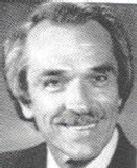
He's, if not in PUBLIC domain, in MY DOMAIN. (Not to mention the Implicit Paternal Permission Stipulation, Paragraph 10, Section 23A, Clause 3.)
AND, it turns out, there are sites that allow fair use of wonderful images, with the appropriate citations. See below:
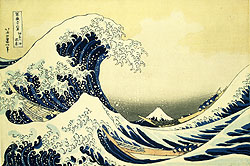
The Great Wave at Kanagawa (from a Series of Thirty-six Views of Mount Fuji), Edo period (1615–1868), ca. 1831–33
Katsushika Hokusai (Japanese, 1760–1849); Published by Eijudo
Japan, Polychrome ink and color on paper; 10 1/8 x 14 15/16 in. (25.7 x 37.9 cm) (Oban size) H. O. Havemeyer Collection, Bequest of Mrs. H. O. Havemeyer, 1929 (JP1847) www.metmuseum.org

photo courtesy of NASA hubble image gallery
Then I began to wonder whether this was actually kosher -- I may not be mooching off Weil's estate, but have I mooched off a website's labor in scanning and putting up her image ? Then I learned that a photo's copyright lasts 70 years after the photographer's death ! Oh dear, oh dear, I thought. And pulled the image off the site. Adieu, Emile.
But Raul Stanati -- that's an entirely different story.
He's my Dad. Anagrammed, of course.

He's, if not in PUBLIC domain, in MY DOMAIN. (Not to mention the Implicit Paternal Permission Stipulation, Paragraph 10, Section 23A, Clause 3.)
AND, it turns out, there are sites that allow fair use of wonderful images, with the appropriate citations. See below:

The Great Wave at Kanagawa (from a Series of Thirty-six Views of Mount Fuji), Edo period (1615–1868), ca. 1831–33
Katsushika Hokusai (Japanese, 1760–1849); Published by Eijudo
Japan, Polychrome ink and color on paper; 10 1/8 x 14 15/16 in. (25.7 x 37.9 cm) (Oban size) H. O. Havemeyer Collection, Bequest of Mrs. H. O. Havemeyer, 1929 (JP1847) www.metmuseum.org

photo courtesy of NASA hubble image gallery
Tuesday, November 11, 2003
Corn #2
This is Marcelle singing about her youth: young, svelte, the singer in a 50's stage band, the Al Michael's Band -- Jim, her husband, is on guitar, and the speaker's father is the band leader. Lots of stuff here is lifted directly from the family saga. The woman who inspired, Marcelle, though, was not a singer. I don't know very much about her at all.
ii. Marcelle’s Song
AL MICH ELS BAND
The marquee announced,
gaptoothed, our good gig,
Hampton Beach Ballroom,
Saturday nights.
It was August 1951.
I was glamorous and thin
scatting onstage
in my sleek green sheath
and cadged pearls.
Behind me Jim comped,
glistening in the spot.
His Gibson archtop gleamed
like honey on a tux.
Strings shivered as he vamped.
I was his silk and ivory,
his butter and cream,
his Satin Doll.
He was my spruce, my salt
my Lover Man.
Enthralled by our Black Magic
the world rose in ovation.
It drowned out
the backstage Atlantic’s crash
and secret hiss.
Of what can I sing now
with this black-keyed mouth
but oil’s luster and sorrow,
a dull gut weight,
an undertow, earth’s ?
ii. Marcelle’s Song
AL MICH ELS BAND
The marquee announced,
gaptoothed, our good gig,
Hampton Beach Ballroom,
Saturday nights.
It was August 1951.
I was glamorous and thin
scatting onstage
in my sleek green sheath
and cadged pearls.
Behind me Jim comped,
glistening in the spot.
His Gibson archtop gleamed
like honey on a tux.
Strings shivered as he vamped.
I was his silk and ivory,
his butter and cream,
his Satin Doll.
He was my spruce, my salt
my Lover Man.
Enthralled by our Black Magic
the world rose in ovation.
It drowned out
the backstage Atlantic’s crash
and secret hiss.
Of what can I sing now
with this black-keyed mouth
but oil’s luster and sorrow,
a dull gut weight,
an undertow, earth’s ?
Yay !
If I had a GOLD STAR I would stick it right smack in the middle of my forehead.
(Psst: dig the cool italic bold !!!)
I am a HACKER !
Note to John Ashcroft: JUST KIDDING ! IRONY !
(Psst: dig the cool italic bold !!!)
I am a HACKER !
Note to John Ashcroft: JUST KIDDING ! IRONY !
Curve 'O' Learning
A small letterboard in the doorway of a local office building lists "The Institue For Teaching Thinking." The pomposity and the clumsy double participle made this an instant family joke.
I have been messing with the blogger template. That's what made me think of "teaching thinking." I managed to turn Anita Rust green, and make her font smaller, then changed her back. (Institute for Shrinking Fonting. Consider the lilies, they neither font nor shrink.)
I learned what a permalink is.
I did manage to shrink the toast's font, but it looked all smashed up and weird, so I restored it.
But the big news is that I have learned to make things bold. And also to italicize them.
Maybe.
Hold on, I'm gonna check. If the internet collapses, let me just state categorically: IT WAS NOT MY FAULT !!!
I have been messing with the blogger template. That's what made me think of "teaching thinking." I managed to turn Anita Rust green, and make her font smaller, then changed her back. (Institute for Shrinking Fonting. Consider the lilies, they neither font nor shrink.)
I learned what a permalink is.
I did manage to shrink the toast's font, but it looked all smashed up and weird, so I restored it.
But the big news is that I have learned to make things bold. And also to italicize them.
Maybe.
Hold on, I'm gonna check. If the internet collapses, let me just state categorically: IT WAS NOT MY FAULT !!!
Monday, November 10, 2003
Marcelle
I'm going to post a series of poems about corn. As in on-the-cob. I have written two series of poems about corn. The first, "Husk," appeared in "Spillway" a year or two ago. This series remains untitled. The first section is free verse, an anomaly for me, and is based on a true story that has haunted me for years. The image of the fat, disheveled, mute, withdrawn woman, all alone in the midnight kitchen, making and eating corn struck me as impossibly sad. I identified with her completely. So I resurrected her as artist and lover in this series. Art, food, sexuality, loneliness, family. The first section introduces Marcelle, and, hopefully, gives us a glimpse of the speaker's father.
i.
Jim felt sorry for his wife, my father said,
Marcelle really let herself go,
she got fat, her teeth were bad,
she never left the house,
didn’t comb her hair, change her nightgown or wash,
she even stopped talking and sleeping, but mainly
she couldn’t stop eating,
it was crazy, Jim said, toward the end
he’d find her in the kitchen at 2 or 3 in the morning
with all the lights out,
and she’d be boiling corn -- corn ! -- the dozen ears
of butter-and-sugar he’d just bought at Angelo’s
would be rattling in the old cast iron cookpot,
the windows would be blank with steam,
husks and silk would be plastered everywhere,
she’d be at the table eating corn, Jesus,
even with her bad teeth she could strip those cobs clean,
and by daybreak eight or nine sticks of oleo
would be flattened, Jim said,
where she’d put each ear through exactly three
slow, careful revolutions, he’d watched her, he said,
and it was terrible.
After they rushed her to Bon Secours
and opened her up
they found a tumor as big as a pumpkin.
You know. Down there,
my father said.
i.
Jim felt sorry for his wife, my father said,
Marcelle really let herself go,
she got fat, her teeth were bad,
she never left the house,
didn’t comb her hair, change her nightgown or wash,
she even stopped talking and sleeping, but mainly
she couldn’t stop eating,
it was crazy, Jim said, toward the end
he’d find her in the kitchen at 2 or 3 in the morning
with all the lights out,
and she’d be boiling corn -- corn ! -- the dozen ears
of butter-and-sugar he’d just bought at Angelo’s
would be rattling in the old cast iron cookpot,
the windows would be blank with steam,
husks and silk would be plastered everywhere,
she’d be at the table eating corn, Jesus,
even with her bad teeth she could strip those cobs clean,
and by daybreak eight or nine sticks of oleo
would be flattened, Jim said,
where she’d put each ear through exactly three
slow, careful revolutions, he’d watched her, he said,
and it was terrible.
After they rushed her to Bon Secours
and opened her up
they found a tumor as big as a pumpkin.
You know. Down there,
my father said.
Sunday, November 09, 2003
Without Appeal
At the chronological and emotional bedrock of my intellectual life, still operative in their imperatives, are two passages from existentialist texts.
The first is Camus' brief project or wager of the "absurd man" in "Myth of Sisyphus" -- "to live without appeal."
The second is Sartre's famous passage in "Nausea" in which his hero, Roquentin, is faced with the sheer, category-and-intellect-violating isness/existence of the root of a chestnut tree -- an experience he finds overwhelming, obscene, and utterly disorienting. As unpleasant as nausea.
From early adolescence, less so as I've grown older, I have been subject to sudden, involuntary spells, often provoked by looking in a mirror, when my experience of myself and existence shifts as suddenly as if a switch has been thrown, and everything, including me, seems harrowingly odd and unfamiliar. When I discovered Sartre's hero's spells of existential "nausea," I instantly recognized my own. These quasi-neurological events seemed linked to the more cerebral experience of being struck to the core with the utter strangeness of being here at all, conscious, existing, the imperfect cognizant fulcrum of "all that is." The Magnum Mysterium.
I have often felt that, if I could sustain that feeling of mystery, if I could sit there with it, press beyond it, I could achieve some sort of breakthrough, some sort of understanding, some sort of odd Kensho from this self-created Mu. I have also felt that meditation might be a means of interrogating, approaching, addressing that strange spot. Honestly, I think a Buddhist could rewrite the Chestnut Tree passage as a spiritual breakthrough -- a radical deconstruction of illusory categories of object and self and society.
But then there's the nagging Camusian voice: sans appel. Live without appeal.
My attraction to Christianity is within the part of me that cannot live without appeal. Christianity seems to me to be one, long, beautiful, harrowingly poignant appeal at whose center is the suffering Christ crucified, forsaken, crying out. Hans Kung writes eloquently in "Why I Am A Christian" about Mark and Matthew's unembellished rendering of Christ's last moments, the ultimate Christian appeal -- "Why have you forsaken me," then a primal "cry," then a man-and-God forsaken death.
The same interrogation of the Mystery seems to inform the best religious music, Bach's masses, Mozart's requiem; Arvo Part's magnificent "De Profundis" never fails to move me, and it is literally the psalmist crying out from the depths.
Is Zen "without appeal" ?
In its abolishing of duality, perhaps.
Once, sitting, feeling bodily pain, experiencing the usual turbulence of the mind, hearing the ambient sounds of the world, experiencing the "I" that was experiencing itself experiencing, and feeling all these things as a field of equivalent phenomena, I had an sudden understanding of "incarnation." To be alive is to suffer and to appeal.
I need to climb back on the zafu. At least.
The first is Camus' brief project or wager of the "absurd man" in "Myth of Sisyphus" -- "to live without appeal."
The second is Sartre's famous passage in "Nausea" in which his hero, Roquentin, is faced with the sheer, category-and-intellect-violating isness/existence of the root of a chestnut tree -- an experience he finds overwhelming, obscene, and utterly disorienting. As unpleasant as nausea.
From early adolescence, less so as I've grown older, I have been subject to sudden, involuntary spells, often provoked by looking in a mirror, when my experience of myself and existence shifts as suddenly as if a switch has been thrown, and everything, including me, seems harrowingly odd and unfamiliar. When I discovered Sartre's hero's spells of existential "nausea," I instantly recognized my own. These quasi-neurological events seemed linked to the more cerebral experience of being struck to the core with the utter strangeness of being here at all, conscious, existing, the imperfect cognizant fulcrum of "all that is." The Magnum Mysterium.
I have often felt that, if I could sustain that feeling of mystery, if I could sit there with it, press beyond it, I could achieve some sort of breakthrough, some sort of understanding, some sort of odd Kensho from this self-created Mu. I have also felt that meditation might be a means of interrogating, approaching, addressing that strange spot. Honestly, I think a Buddhist could rewrite the Chestnut Tree passage as a spiritual breakthrough -- a radical deconstruction of illusory categories of object and self and society.
But then there's the nagging Camusian voice: sans appel. Live without appeal.
My attraction to Christianity is within the part of me that cannot live without appeal. Christianity seems to me to be one, long, beautiful, harrowingly poignant appeal at whose center is the suffering Christ crucified, forsaken, crying out. Hans Kung writes eloquently in "Why I Am A Christian" about Mark and Matthew's unembellished rendering of Christ's last moments, the ultimate Christian appeal -- "Why have you forsaken me," then a primal "cry," then a man-and-God forsaken death.
The same interrogation of the Mystery seems to inform the best religious music, Bach's masses, Mozart's requiem; Arvo Part's magnificent "De Profundis" never fails to move me, and it is literally the psalmist crying out from the depths.
Is Zen "without appeal" ?
In its abolishing of duality, perhaps.
Once, sitting, feeling bodily pain, experiencing the usual turbulence of the mind, hearing the ambient sounds of the world, experiencing the "I" that was experiencing itself experiencing, and feeling all these things as a field of equivalent phenomena, I had an sudden understanding of "incarnation." To be alive is to suffer and to appeal.
I need to climb back on the zafu. At least.
Holy Sabbath, Batman !
Remember the Sabbath, and keep it holy.
DK was puzzled when I reacted with disapproval at a recent legislative proposal that it be legal to sell liquor on Sundays. The proscription aginst selling booze on Sunday is a remnant of our fine state's Puritanical "Blue Laws," Laws in the fine tradition of "banned in Boston," and, I suppose, as a supporter of strict church/state separation, stating my chagrin was inconsistent and out of character. I can imagine that these "Blue Laws" have and may still contain various stipulations against private sexual behavior that would arouse my ire and get me locked up were they enforced.
Nonetheless, the same impetus that draws me to the divine office -- an admiration for the liturgical sanctification of time -- gives me an atavistic fondness for the idea of a Sabbath.
I once saw a patient, a young muslim man, who'd gotten pre-patellar bursitis from facing mecca and praying five times a day. I was deeply impressed.
I remember churchgoing from childhood. I distinctly remember and can summon a sinking, sickish, vaguely anxious and itchy feeling it instilled in me in the pit of my chest, some compound of dressing up, candlesmoke, cigarette smoke and perfume in a closed-up car, sitting between the parents on a hard pew in a room full of dressed-up adults, and not connecting with any of the rituals at all. It was all so well-lit and public: tall plain glass windows, everything painted a brilliant, scathing white.
For two or three years I have been debating churchgoing again. Haven't set foot NEAR a church, though. The Catholics won't have me (divorced, remarried, adulteress, a "scandal") and, frankly, they've just too much awful stuff encrusting their profound mystical roots for me to even consider it ; I simply don't see myself returning to the hale, sociable fellowship of the United Church Of Christ; I've been curious about the Episcopal Church (any Protestant denomination with monastic communities and an open Communion is OK in my book) but the brouhaha over Bishop Robinson has troubled me, seeming to indicate a deep strain of scriptural fundamentalism and literalism that's repugnant.
Plus it seems to me that even public worship should be semi-private. And that places of mystery should have at least a FEW shadows. There wasn't a single solitary shadow in the West Parish Congregational Church in Andover Massachusetts, not a one. That was one bright church. They should have distributed Raybans along with the church bulletin. Although I think poet Norman Dubie's father was the pastor there when I attended, a fact which has always charmed me, and may, like many charming facts, not even be true.
Not to mention that I do not accept Jesus Christ as my Personal Savior, or "believe in God" in the traditional, dualistic sense.
My meditation practice lapsed -- let me rephrase that -- I stopped meditating regularly maybe six months ago. I sat with a local Zen group a few times -- I think of them as the (chronological) Zen Babies as I was old enough to be most of their mothers -- but did not follow through. I have not ruled out returning. I, of course, was the real Zen Baby.
There is a part of me that yearns for a teacher, a sangha.
It seeems that not only is the "leap of faith" beyond me, even the step across the threshold of a church is daunting.
There's a psalm that has a verse that's variably translated, but in one version it says something like "it's better to be on the threshold of the house of God than to dwell in the tent of the wicked."
I'm on that threshold, I think.
When, of course, I'm not in that tent.
DK was puzzled when I reacted with disapproval at a recent legislative proposal that it be legal to sell liquor on Sundays. The proscription aginst selling booze on Sunday is a remnant of our fine state's Puritanical "Blue Laws," Laws in the fine tradition of "banned in Boston," and, I suppose, as a supporter of strict church/state separation, stating my chagrin was inconsistent and out of character. I can imagine that these "Blue Laws" have and may still contain various stipulations against private sexual behavior that would arouse my ire and get me locked up were they enforced.
Nonetheless, the same impetus that draws me to the divine office -- an admiration for the liturgical sanctification of time -- gives me an atavistic fondness for the idea of a Sabbath.
I once saw a patient, a young muslim man, who'd gotten pre-patellar bursitis from facing mecca and praying five times a day. I was deeply impressed.
I remember churchgoing from childhood. I distinctly remember and can summon a sinking, sickish, vaguely anxious and itchy feeling it instilled in me in the pit of my chest, some compound of dressing up, candlesmoke, cigarette smoke and perfume in a closed-up car, sitting between the parents on a hard pew in a room full of dressed-up adults, and not connecting with any of the rituals at all. It was all so well-lit and public: tall plain glass windows, everything painted a brilliant, scathing white.
For two or three years I have been debating churchgoing again. Haven't set foot NEAR a church, though. The Catholics won't have me (divorced, remarried, adulteress, a "scandal") and, frankly, they've just too much awful stuff encrusting their profound mystical roots for me to even consider it ; I simply don't see myself returning to the hale, sociable fellowship of the United Church Of Christ; I've been curious about the Episcopal Church (any Protestant denomination with monastic communities and an open Communion is OK in my book) but the brouhaha over Bishop Robinson has troubled me, seeming to indicate a deep strain of scriptural fundamentalism and literalism that's repugnant.
Plus it seems to me that even public worship should be semi-private. And that places of mystery should have at least a FEW shadows. There wasn't a single solitary shadow in the West Parish Congregational Church in Andover Massachusetts, not a one. That was one bright church. They should have distributed Raybans along with the church bulletin. Although I think poet Norman Dubie's father was the pastor there when I attended, a fact which has always charmed me, and may, like many charming facts, not even be true.
Not to mention that I do not accept Jesus Christ as my Personal Savior, or "believe in God" in the traditional, dualistic sense.
My meditation practice lapsed -- let me rephrase that -- I stopped meditating regularly maybe six months ago. I sat with a local Zen group a few times -- I think of them as the (chronological) Zen Babies as I was old enough to be most of their mothers -- but did not follow through. I have not ruled out returning. I, of course, was the real Zen Baby.
There is a part of me that yearns for a teacher, a sangha.
It seeems that not only is the "leap of faith" beyond me, even the step across the threshold of a church is daunting.
There's a psalm that has a verse that's variably translated, but in one version it says something like "it's better to be on the threshold of the house of God than to dwell in the tent of the wicked."
I'm on that threshold, I think.
When, of course, I'm not in that tent.
